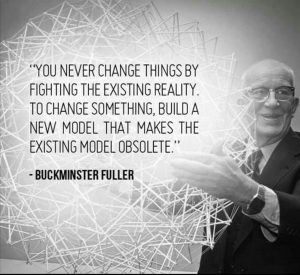Religious Humanism has something to bother everyone.
If you are religious, the idea of improving or replacing religion likely seems blasphemous.
If you are not religious, the idea of improving or replacing religion likely seems preposterous!
Isn’t religion outdated? False? Harmful? Even if we could create some sort of better religion, how would we get people to join it?
And can’t we just ditch religion and help each other and fix the world’s problems? Love is all we need, right?
Unfortunately, not so much. We as humans are often well-intentioned, but without exception we remain profoundly limited.
Religious Humanism takes religion seriously. Religious Humanism takes human nature seriously.
 Religion engages us individually and collectively like no other aspect of culture (though sports comes impressively close). Instead of getting rid of religion, I think we need to improve and redirect it. Religion as it currently exists will not decrease or improve until we come up with something better.
Religion engages us individually and collectively like no other aspect of culture (though sports comes impressively close). Instead of getting rid of religion, I think we need to improve and redirect it. Religion as it currently exists will not decrease or improve until we come up with something better.
And even the most capable among us fail to achieve all their goals all the time. As humans we want to be right. We resist accepting accountability. We tend to put forth the minimum effort required to achieve our goals. We would rather be comfortable than good–but we want to be thought of as good, including by ourselves.
What does all this have to do with Religious Humanism?
Religious Humanism seeks to heal the world through religion done better. And not just any religion—rigorous religion that fully engages the human experience.
Specifically, Religious Humanism seeks to foster individual and collective well-being. It functions as an operating system to help people care about and address the urgent problems that face today’s world. It does this by:
- Using Social Science to understand human nature, specifically what motivates and inspires in effective and sustainable ways
- Reverse engineering religion
- Translating those religious elements into culturally specific narratives (because we humans do best with concrete, specific ideas and institutions)
Religious Humanism meets the needs of everyone. Bold statement I know, but bear with me.
In order to fix religion for everyone, we need to meet the needs of three groups:
- Those affiliated with religion
- Those unaffiliated who don’t want to be affiliated with a structured community
- Those unaffiliated who do want to be affiliated with a structured community
We can address the needs of the three groups using three approaches.
Religion Better Than True
The best thing we can do for those affiliated with religion (about 85% of the global population) is make existing religion better. A major problem of religious reform is that the “reformed” religion often becomes less recognizable to its own followers (by attempting to shift to non-literal belief, for example). Religion Better Than True articulates approaches to existing religions that don’t rely on truth claims to justify investment, but also remain recognizable to adherents. In fact, if done right, this approach makes the religion feel more good and more true to believers. It represents the best version of existing religions.
Spiritual Training Regimen
The Spiritual Training Regimen religionizes YOU. It is the religion of you. What motivates you? What inspires you? What are your sacred texts? What are your hymns? What are your commandments and vows, sacraments and sacred spaces? The Spiritual Training Regimen uses ritual to improve well-being through intention, mindfulness, consistency, and accountability.
Religious Humanist Denominations
My “aha” moment in developing a new religion is where I realized we don’t need to develop a new religion. That is, we don’t need a new myth or a new narrative. Instead, I flipped the issue: Instead of inventing a new religion, why don’t we take what people already love, already invest in, already use to organize their lives, and turn those elements of culture into religions?
But why do we need religion at all? Because religion uniquely engages with human nature, and the only thing that can compete with religion is religion. I am thus developing three primary Religious Humanist Denominations:
- Life Church, which “religionizes” science, literature, art, education, and other aspects of culture.
- Earth Church, which religionizes environmentalism, outdoors enthusiasm, paganism, and indigenous traditions.
- Geek Church, which religionizes fantasy, science fiction, comic books, and other aspects of popular culture.



So whether you are affiliated with a religious denomination, want to simply become a better version of yourself, or hope for an updated version of religion, Religious Humanism has you covered.


Recent Comments